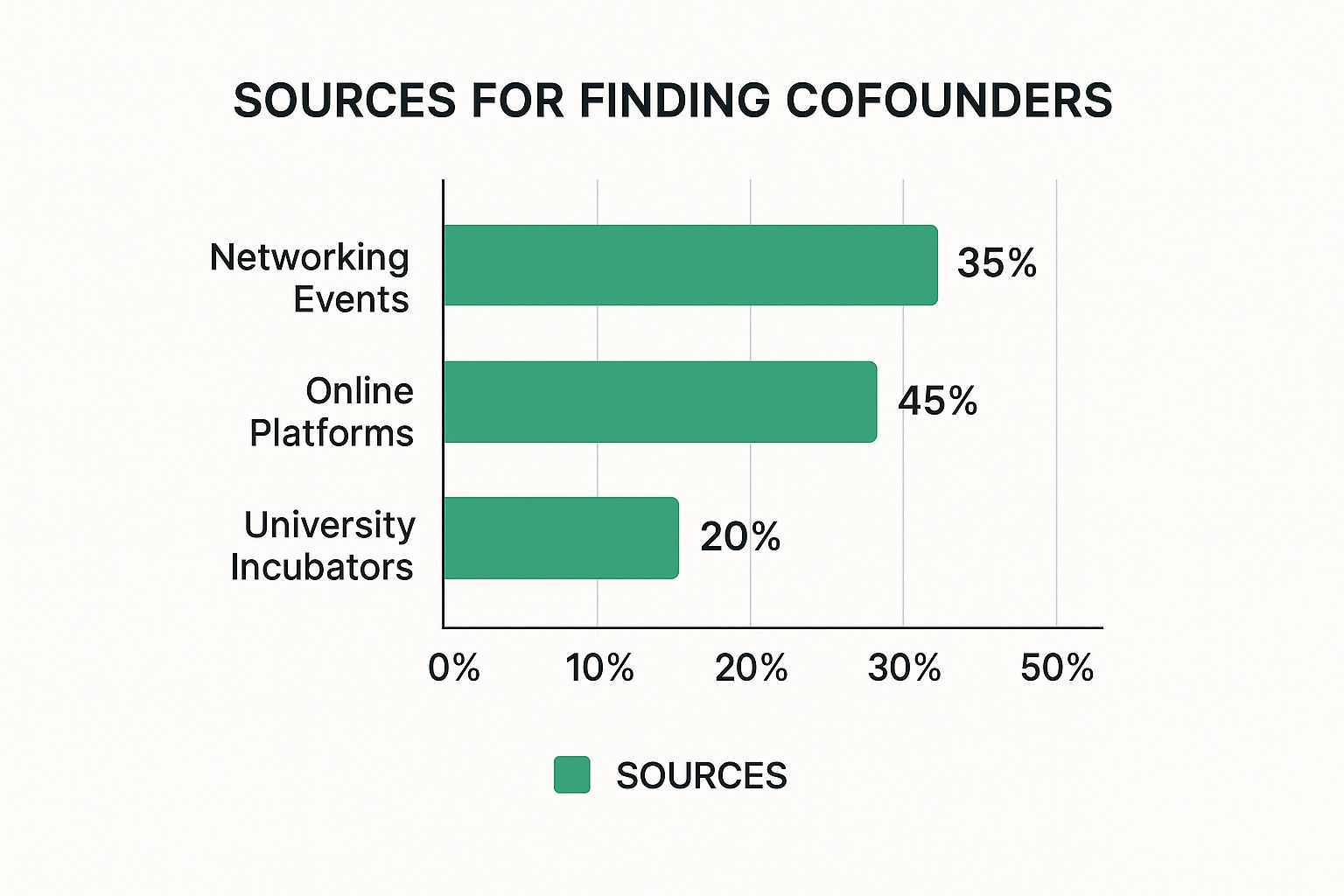Why Finding a Co-founder Dramatically Transforms Your Odds

Building a successful startup is rarely a solo endeavor. While the entrepreneurial journey is often portrayed as a solitary pursuit, the reality is quite different. Finding a co-founder can dramatically increase your chances of success. This isn't just an observation; data consistently shows that founding teams outperform solo entrepreneurs.
The Power of Shared Vision and Complementary Skills
Venture capitalists often prioritize teams over individuals. They recognize the inherent value in a diverse skillset within a founding team. This broader range of expertise allows teams to approach challenges from multiple perspectives. For example, one co-founder might be a strong product developer while the other excels at marketing and sales. This creates a more adaptable and resilient organization.
A shared passion and vision also fuel perseverance through the inevitable ups and downs of startup life. This collaborative dynamic enhances decision-making as well. Constructive disagreement between co-founders can lead to more comprehensive analysis and better decisions. Imagine two co-founders discussing a crucial marketing strategy. Their differing perspectives might reveal innovative approaches or uncover potential problems that wouldn't have been considered individually. This ability to challenge assumptions is crucial for success. If you’re unsure about finding a co-founder, you could consider a fractional CTO. Learn more about this alternative at Fractional CTO Alternative To Technical Co Founder.
Distributing the Burden, Amplifying the Momentum
The startup journey is demanding, both emotionally and mentally. Co-founders provide essential support during these challenging times. They share the heavy workload, helping to prevent burnout and allowing each founder to focus on their strengths. This shared responsibility also includes the emotional burdens inherent in entrepreneurship. During difficult periods, co-founders offer encouragement, perspective, and motivation when individual drive falters.
Data supports the benefits of having a co-founder. One key statistic is the correlation between the number of founders and a startup's success rate. Startups with co-founders generally have higher survival and success rates compared to solo founders. Research shows the average number of founders in successful startups is around 2.09. This suggests that two founders often achieve an optimal balance between shared workload and efficient decision-making. You can find additional insights about the founder factor on startup success. Finding the right co-founder isn’t simply about dividing the work; it's about combining strengths to build a more resilient and ultimately, more successful venture.
Mapping Your Cofounder Blueprint: Skills, Values, and Vision

Before you begin your search for a cofounder, it's crucial to understand exactly what you're looking for. This clarity is the bedrock of any successful cofounder relationship. It involves understanding your own strengths and weaknesses, and pinpointing the essential skills a potential partner should bring to the table.
Identifying Your Strengths and Gaps
The first step in the cofounder search process is a thorough self-assessment. Honestly evaluate your skills and identify your core competencies. Are you a tech expert? A marketing whiz? A financial guru? Knowing your strengths is important.
Equally vital is acknowledging your weaknesses. What areas do you struggle with? Where could a cofounder's expertise complement your own? This self-awareness will paint a clear picture of the skills your ideal cofounder should possess.
Values Alignment: The Foundation of a Strong Partnership
Skills are essential, but shared values are paramount for a long-lasting and productive cofounder relationship. Identify your non-negotiable values. These could include work ethic, commitment level, risk tolerance, or preferred communication style.
While diverse perspectives are beneficial, core value alignment is crucial for navigating the inevitable ups and downs of building a startup. This alignment builds a strong foundation of trust and mutual respect, enabling productive collaboration and effective conflict resolution.
Articulating Your Vision: Attracting the Right Partner
A clearly articulated vision acts as a powerful magnet for potential cofounders. It helps you attract partners who resonate with your goals and ambitions, while also filtering out those who aren't the right fit.
This means defining not just what you want to build, but also why. What problem are you solving? What impact do you hope to make on the world? A compelling vision inspires others and serves as a central rallying point for your team. This shared purpose fosters motivation and resilience, propelling the venture forward even through challenging times.
Complementary Skills: Building a Balanced Team
Many founders seek cofounders with similar skill sets. However, true strength lies in complementarity, not duplication. Look for partners who fill your skill gaps and contribute diverse perspectives.
This creates a more balanced and robust team, better equipped to handle the multifaceted challenges inherent in the startup environment. A team with complementary skills functions like a well-oiled machine, each part playing a distinct and vital role. This synergy amplifies the team's overall effectiveness and significantly boosts the likelihood of success. IndieMerger can assist in this process, connecting you with verified founders possessing complementary skills, helping you build your startup more efficiently. You can learn more about IndieMerger and its services at IndieMerger.
Where Exceptional Cofounders Are Actually Found
Finding the right cofounder is essential for startup success. It's not simply about filling a skills gap; it's about finding someone who shares your vision and complements your strengths. This requires knowing where to look and how to identify genuine partnership potential.
Beyond the Usual Suspects: Exploring Untapped Talent Pools
Many founders limit their search to their immediate network. However, broadening your search can yield exceptional results. Consider exploring niche online forums, Slack communities, and alumni networks. These underutilized resources often connect you with individuals possessing diverse perspectives and specialized skills. Attending a specialized tech conference, for example, could lead you to potential technical cofounders you wouldn't encounter at a general networking event.
Online Platforms: Connecting With Potential Partners
Online platforms have become a go-to resource for cofounder searches. Some platforms offer tailored matching algorithms based on skill sets, industry experience, and even personality traits. This targeted approach can streamline the process and connect you with compatible partners. However, platform effectiveness varies. Some excel at short-term project-based connections, while others focus on fostering deeper, long-term partnerships. Researching each platform’s strengths and success stories will guide you to the right fit.
In-Person Connections: The Value of Direct Interaction
While online platforms offer convenience, in-person interactions remain invaluable. Startup weekends, hackathons, and industry-specific conferences create organic collaboration opportunities. These shared experiences offer insights into a potential cofounder's work ethic, problem-solving skills, and communication style. This direct observation surpasses the polished image presented in online profiles. University incubators and accelerator programs also nurture emerging ventures, fostering cofounder connections based on complementary skills and shared industry interests. The following infographic illustrates the relative success of these various avenues:

As the infographic shows, online platforms are the most common source for finding cofounders, followed by networking events and university incubators. This underscores the growing importance of digital channels in connecting entrepreneurs. However, the success rates highlight the need for a strategic approach that combines online and in-person strategies. Launching a startup typically costs around $3,000, and first-time founders have only an 18% success rate, emphasizing the challenge of succeeding without a strong team. For more detailed statistics, see this article.
To help you further evaluate different methods, consider the following comparison:
Cofounder Finding Methods Comparison
This table compares different methods of finding cofounders, their effectiveness, time investment required, and typical quality of matches.
| Method |
Effectiveness Rating |
Time Investment |
Match Quality |
Best For |
| Online Platforms |
High |
Medium |
Medium |
Quick connections, diverse pool of candidates |
| Networking Events |
Medium |
Medium |
Medium |
Industry-specific connections |
| University Incubators |
High |
High |
High |
Early-stage ventures, shared learning |
| Hackathons |
Medium |
Low |
Medium |
Project-based collaborations |
| Personal Network |
Low |
Low |
Variable |
Initial exploration, trusted connections |
This table summarizes the key pros and cons of each method, emphasizing the importance of choosing the approach best suited to your specific needs and resources.
Optimizing Your Search: Quality Over Quantity
Regardless of the platform or method, prioritize building genuine relationships over simply collecting contacts. Engage in meaningful conversations exploring shared interests, values, and long-term goals. Actively participate in online communities, offering insightful comments and support. At in-person events, focus on making authentic connections with individuals who resonate with your vision. Platforms like IndieMerger can facilitate this process by connecting verified founders with complementary skills. This emphasis on quality interactions significantly increases your chances of finding a cofounder who is not just a business partner but a true ally.
Evaluating Potential Cofounders Beyond the Surface

Meeting potential cofounders is just the first step. A thorough evaluation process is crucial for building a strong, lasting partnership and preventing future conflicts. This section offers a framework for assessing candidates beyond first impressions and resumes. Finding the right cofounder requires a proactive approach. Innovative talent acquisition strategies can significantly improve your search.
Beyond the Resume: Probing Deeper for Compatibility
Resumes provide a snapshot of a candidate’s skills and experience, but they rarely reveal the deeper compatibility factors essential for a successful cofounder relationship. This means going beyond superficial conversations and asking targeted questions. These questions should uncover shared values, work styles, and long-term goals.
For example, discussing how a candidate approaches conflict resolution can offer crucial insights. You can learn about their communication style and ability to navigate disagreements constructively.
Understanding a potential cofounder’s risk tolerance is also essential, especially in the often volatile startup environment. Some people flourish in high-risk, high-reward scenarios. Others prefer a more cautious approach. Aligning on risk tolerance is vital for making strategic decisions and weathering inevitable challenges. This also applies to financial expectations. Openly discussing these early on can prevent misunderstandings and ensure everyone agrees on long-term financial strategies.
Reference Checks: Getting Honest Insights
Reference checks can be incredibly valuable if conducted effectively. They shouldn't just be a formality to verify employment history. Instead, focus on gaining insights into the candidate's work ethic, collaborative style, and ability to handle pressure.
Ask specific, behavioral questions. Encourage references to share concrete examples. For instance, asking, "Can you describe a time this candidate faced a significant challenge? How did they handle it?" can reveal valuable information about their problem-solving skills and resilience.
Observing Candidates in Action: Simulations and Mini-Projects
One of the best ways to evaluate a potential cofounder is to observe them in action. Design mini-projects or simulated challenges relevant to your startup. This provides a practical glimpse into their work style, problem-solving approach, and ability to collaborate under pressure. It also allows you to assess their communication style and team interactions.
These real-world simulations can reveal both red flags and green flags. For example, a candidate consistently dominating conversations or dismissing others’ ideas could be a warning sign for future collaboration. On the other hand, active listening, thoughtful contributions, and strong problem-solving skills could indicate exceptional partnership potential.
Before diving into a partnership, consider using a Cofounder Compatibility Assessment Checklist like the one below to thoroughly evaluate potential cofounders across essential areas beyond technical skills:
| Compatibility Factor |
Questions to Ask |
Observations to Make |
Importance Level |
| Work Style |
What's your preferred work environment? How do you handle pressure? |
Observe their organization, time management, and response to stress in simulations. |
High |
| Risk Tolerance |
How comfortable are you with uncertainty and high-stakes decisions? |
Assess their reactions to hypothetical challenges and risk-related scenarios. |
High |
| Communication Style |
How do you prefer to communicate? How do you handle disagreements? |
Note their communication patterns in meetings and during project collaborations. |
High |
| Long-Term Vision |
Where do you see yourself and the company in 5 years? |
Compare their vision with yours and evaluate potential conflicts. |
High |
| Values |
What are your core values? What's important to you in a work environment? |
Look for alignment with your company's values and mission. |
High |
| Financial Expectations |
What are your financial goals for the company? |
Discuss salary expectations, equity splits, and long-term financial strategies. |
High |
This checklist provides a framework for structured conversations and observations, promoting a more objective and thorough cofounder selection process. By addressing these key compatibility factors, you can significantly reduce the risk of future conflicts and increase the likelihood of a successful partnership.
Identifying Red Flags and Green Flags
While technical skills and experience are important, soft skills are equally crucial. Communication, empathy, and adaptability are key for a successful cofounder relationship. Pay attention to both subtle cues and obvious behaviors.
Someone consistently missing deadlines or failing to follow through on commitments could signal potential reliability issues. Conversely, a candidate who proactively offers solutions, takes initiative, and demonstrates a positive attitude could indicate a strong work ethic and collaborative spirit.
Building a Strong Foundation for Success
Evaluating potential cofounders requires a thoughtful, multi-faceted approach that goes beyond initial assessments. By probing deeper into compatibility, conducting effective reference checks, and observing candidates in action, you can significantly improve your chances of finding a partner who complements your skills and shares your vision and values. This careful evaluation process builds the foundation for a strong, resilient, and ultimately successful cofounder relationship.
Building Unshakable Cofounder Relationships That Last
Finding the right cofounder is a significant milestone, but the journey truly begins after the initial excitement fades. The real challenge lies in nurturing a robust and resilient partnership capable of weathering the storms of startup life. This requires proactive communication, well-defined agreements, and a shared commitment to navigating obstacles together.
Establishing Clear Expectations From Day One
Successful cofounder relationships thrive on transparency and mutual understanding. This starts with establishing clear expectations from the very beginning, outlining roles, responsibilities, and decision-making authority. Who will spearhead product development? Who will manage marketing and sales? How will crucial decisions be made? Addressing these questions early on minimizes ambiguity and potential conflicts later. For instance, a clear division of labor based on each cofounder's strengths can optimize efficiency and prevent overlapping responsibilities.
Additionally, establishing clear communication protocols is paramount. How often will you meet? Which Slack channels will you use? What's the expected response time for urgent matters? These seemingly minor details can significantly influence team dynamics and prevent misunderstandings. Clear communication guidelines ensure everyone is informed and can access necessary information efficiently.
Navigating Challenges With Transparency and Respect
Even with clear expectations, disagreements are inevitable in any partnership. Establishing a framework for conflict resolution is crucial. This could involve a neutral third party to mediate disputes or a structured process for discussing disagreements constructively. The key is to address conflicts openly and respectfully, focusing on solutions that benefit the company as a whole, rather than letting personal differences hinder progress.
Furthermore, open communication about equity splits, workload expectations, and potential exit strategies is essential. These conversations might be difficult, but avoiding them can breed resentment and mistrust. Transparency ensures everyone feels valued and understands their stake in the venture. The importance of cofounders is evident in the success of many billion-dollar companies. Since 2005, roughly 80% of startups reaching billion-dollar valuations had two or more founders, highlighting the power of strong teams. Learn more about this here.
Maintaining Alignment Through Regular Check-Ins
Regular check-ins are vital for maintaining a strong cofounder relationship. These meetings provide a dedicated space to discuss progress, address challenges, and ensure everyone remains aligned with the company's vision and objectives. They also offer an opportunity to celebrate successes and acknowledge individual contributions, fostering a sense of shared accomplishment and mutual appreciation. These check-ins can be formal, structured meetings or informal discussions. The key is consistent communication that keeps everyone connected and working towards a common goal.
Preserving Your Personal Connection
The intensity of startup life can strain even the closest relationships. It's essential to nurture the personal connection alongside the professional one. This might involve setting aside time for social activities outside of work or simply checking in with each other on a personal level. Supporting each other through the inevitable ups and downs of entrepreneurship strengthens the bond and builds a foundation of trust and mutual respect that extends beyond the business. This personal connection often helps cofounders navigate the most challenging times and emerge stronger. Just as regular maintenance is essential for a machine, consistent effort is needed to keep a cofounder relationship healthy and productive. By prioritizing communication, transparency, and mutual respect, cofounders can build a lasting partnership that drives their venture forward and stands the test of time.
Protecting Yourself: Essential Legal Frameworks When Finding a Cofounder
Finding the right co-founder is exciting, but protecting your interests is paramount. Solid legal frameworks are essential from the outset, safeguarding both your innovative idea and individual contributions. This section provides practical legal guidance, easy to understand and implement.
Founder Agreements: The Foundation of Your Partnership
A Founder Agreement is a crucial first step after deciding to collaborate with a potential co-founder. This legally binding contract clarifies the terms of your partnership. It outlines roles, responsibilities, equity splits, vesting schedules, and how decisions will be made. This initial clarity helps prevent future disagreements and ensures everyone starts on the same page. For example, the agreement should detail the ownership structure reflecting each founder's contribution, whether it's significant capital or technical expertise.
Equity Vesting: Protecting Your Stake Over Time
Equity vesting grants ownership gradually over a set period. This mechanism protects everyone involved. A typical vesting schedule might be four years with a one-year cliff. This means no equity vests in the first year, then vests monthly over the remaining three. This structure incentivizes long-term commitment. It also ensures equity is earned through continued contribution, protecting your stake if a co-founder departs early.
Intellectual Property: Ensuring Clear Ownership
Before starting collaborative work, define intellectual property (IP) ownership clearly. A written agreement should specify who owns the initial idea, code, designs, and content produced during the search and early development stages. This prevents future disputes and protects the business’s core assets, especially important when developing new technologies or creative content. Clarifying IP ownership upfront is a key step in building a strong foundation.
Handling the Interim Period: Protecting Your Ideas While Exploring Partnerships
The early stages of a potential partnership require careful handling. As you build rapport and assess compatibility, you'll inevitably share information. A Non-Disclosure Agreement (NDA) protects your confidential information during these exploratory conversations, legally obligating the other party to maintain secrecy. A Letter of Intent (LOI) outlines the general terms of a potential partnership before formal agreements are finalized. This shows serious intent while providing flexibility during final negotiations.
Learning From Real-World Examples
Real-world scenarios demonstrate the value of legal frameworks. In one case, a well-drafted founder agreement with a vesting schedule protected a founder's ownership when their co-founder left early. In another, a clear IP assignment agreement ensured the company retained ownership of crucial software. These examples emphasize the importance of proactive legal planning. Using a platform like IndieMerger, focused on connecting verified founders, adds another layer of security and trust.
When Flying Solo Makes More Sense Than Finding a Cofounder
While partnering with a co-founder can be advantageous, it isn't the ideal path for every entrepreneur. This section explores scenarios where going solo might be preferable and offers alternative approaches to building a thriving startup independently. This important decision necessitates a thorough evaluation of your individual circumstances, business model, and personal preferences.
Assessing Your Capabilities and Support Network
One of the first steps in determining whether to go solo or seek a co-founder is a realistic self-assessment. Are you comfortable juggling multiple roles and handling diverse responsibilities? Do you possess the skills and experience necessary to manage all facets of your startup, from product development and marketing to finance? If you have a broad skillset and flourish in independent environments, going solo might be a suitable option.
However, even independent founders require support. Assess your existing network. Do you have access to mentors, advisors, or a strong professional community you can lean on for guidance and assistance? A robust network can fill some of the voids a co-founder might typically address, offering invaluable advice and connections. This external support becomes particularly vital during challenging periods.
Business Model and Solo Suitability
Certain business models are more conducive to solo founding than others. For instance, a freelance consultant or a solo software developer can cultivate a successful business independently. These models often demand deep expertise in a particular domain, which a solo founder can effectively utilize. Conversely, more complex ventures, especially those requiring substantial capital or a diverse range of expertise, might benefit from a co-founding team.
Alternatives to Cofounders: Building Your Support System
Even without a co-founder, you can establish a support structure that empowers your venture. Fractional leadership provides access to seasoned professionals on a part-time basis, offering specialized skills without the full-time commitment of a co-founder. Establishing an advisory board can also provide strategic guidance and valuable industry insights. Offering early employees equity can incentivize talented individuals and cultivate a sense of shared ownership, fostering a committed and engaged team. These alternatives can offer many of the advantages of a co-founder relationship without necessitating a full partnership.
Strengthening Your Founder-Market Fit While Searching
If you decide to continue your search for a co-founder, concentrating on strengthening your founder-market fit is paramount. This involves validating your business idea, understanding your target audience, and generating early traction. This progress not only attracts potential co-founders but also demonstrates your commitment and improves your chances of securing funding. Instead of passively waiting for the ideal match, actively developing your business enhances your appeal to potential partners and positions you for long-term success. This shows you're not just seeking a partner, but building a valuable venture worth joining.
Making the Decision With Confidence
Deciding whether to seek a co-founder represents a significant step in your entrepreneurial journey. By honestly assessing your capabilities, evaluating your support network, and considering the unique needs of your business model, you can make a well-informed decision that aligns with your personal circumstances and long-term objectives. Whether you opt to fly solo or embark on the quest for a partner, concentrating on building a solid foundation and strengthening your founder-market fit lays the groundwork for a successful venture.
Ready to connect with verified founders and explore potential partnerships? Visit IndieMerger today and start building your dream team.